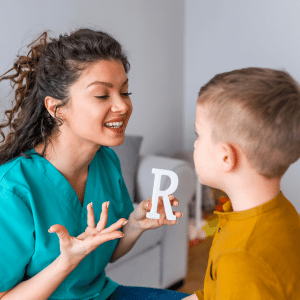By: Giselle Nunez, SLPA
Have you noticed that your child has trouble making the R sound? Have you been frustrated trying to correct it to no avail? Here we explain a little about this peculiar sound.

The R sound is one of the most used in both the English and Spanish languages. Therefore when it is not produced correctly, speech can sound distorted. The R sound is typically acquired later in development, maturing completely between 6 or 7 years. As this sound develops later, it can be wrongly decided to do nothing about it. Sometimes waiting is the right thing to do, but other times intervention and therapy are needed.
As a child grows older and may not be able to produce the R sound in their language, they become more aware of their problem and this can negatively affect their confidence. A low confidence level can keep children from participating in social, family, and school activities that can affect their long-term performance in all aspects of their life.
So, what should we do?
The right thing to do is to have a full evaluation with a Speech-Language Pathologist (SLP) as soon as the problem is identified. There are many components that affect the reception and production of sounds, and depending on the cause, the clinician will determine whether or not therapy is needed.

How is it corrected?
A popular technique for correcting pronunciation is to identify sounds and work to correct those sounds in isolation. Then the child moves to producing the sound within words. The position of the sound within a word is generally considered and discussed. That is, practicing the sound when it appears at the beginning of the word, in the middle, and at the end of the word (initial, medial or final positions). Typical treatment includes drilling the same sound over and over again to improve muscle memory. Through this method, success is achieved by targeting a sound in a phonetically consistent way.
It is a team effort, the SLP will determine the problem and create the most effective treatment plan for your child, but it is also their duty to guide the parents for work at home and at school. Never be left with doubts and always ask what is the best way to help your child at home, hand-in-hand with your therapist.


0 Comments